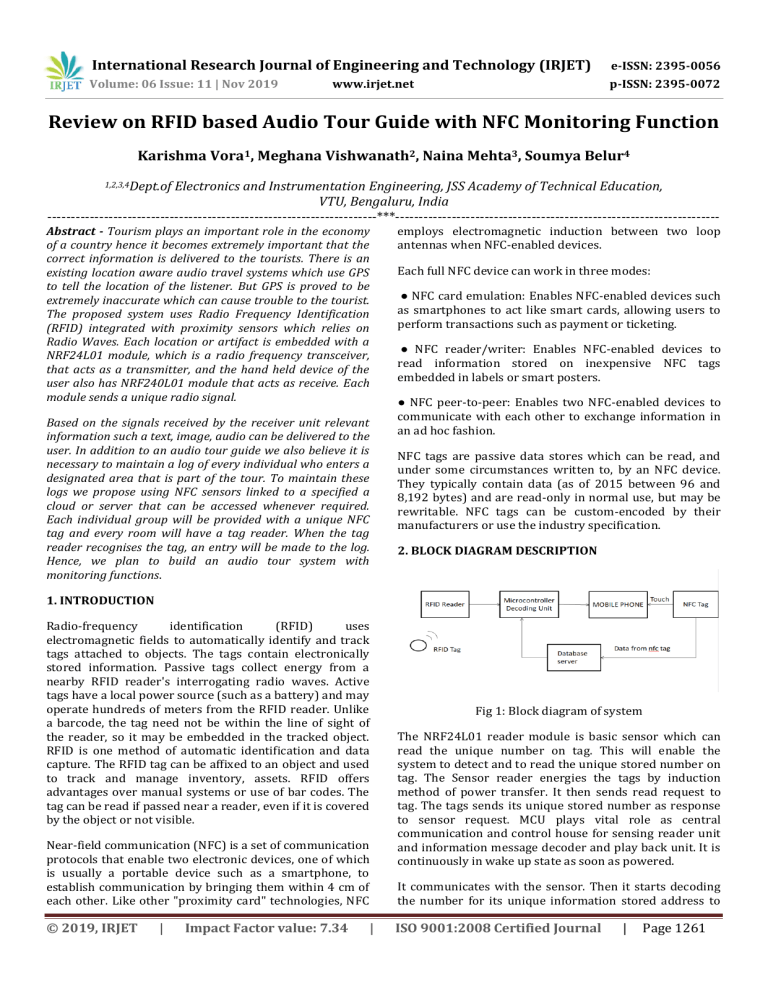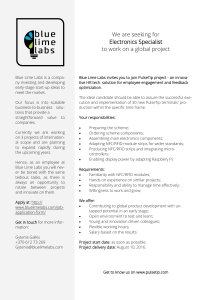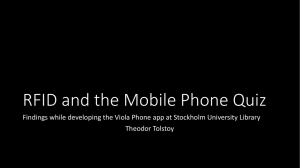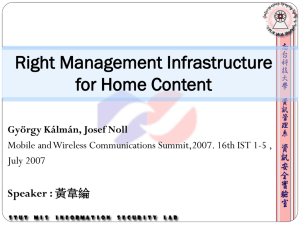IRJET-Review on RFID based Audio Tour Guide with NFC Monitoring Function
advertisement

International Research Journal of Engineering and Technology (IRJET) e-ISSN: 2395-0056 Volume: 06 Issue: 11 | Nov 2019 p-ISSN: 2395-0072 www.irjet.net Review on RFID based Audio Tour Guide with NFC Monitoring Function Karishma Vora1, Meghana Vishwanath2, Naina Mehta3, Soumya Belur4 1,2,3,4Dept.of Electronics and Instrumentation Engineering, JSS Academy of Technical Education, VTU, Bengaluru, India ----------------------------------------------------------------------***--------------------------------------------------------------------Abstract - Tourism plays an important role in the economy of a country hence it becomes extremely important that the correct information is delivered to the tourists. There is an existing location aware audio travel systems which use GPS to tell the location of the listener. But GPS is proved to be extremely inaccurate which can cause trouble to the tourist. The proposed system uses Radio Frequency Identification (RFID) integrated with proximity sensors which relies on Radio Waves. Each location or artifact is embedded with a NRF24L01 module, which is a radio frequency transceiver, that acts as a transmitter, and the hand held device of the user also has NRF240L01 module that acts as receive. Each module sends a unique radio signal. Based on the signals received by the receiver unit relevant information such a text, image, audio can be delivered to the user. In addition to an audio tour guide we also believe it is necessary to maintain a log of every individual who enters a designated area that is part of the tour. To maintain these logs we propose using NFC sensors linked to a specified a cloud or server that can be accessed whenever required. Each individual group will be provided with a unique NFC tag and every room will have a tag reader. When the tag reader recognises the tag, an entry will be made to the log. Hence, we plan to build an audio tour system with monitoring functions. employs electromagnetic induction between two loop antennas when NFC-enabled devices. Each full NFC device can work in three modes: ● NFC card emulation: Enables NFC-enabled devices such as smartphones to act like smart cards, allowing users to perform transactions such as payment or ticketing. ● NFC reader/writer: Enables NFC-enabled devices to read information stored on inexpensive NFC tags embedded in labels or smart posters. ● NFC peer-to-peer: Enables two NFC-enabled devices to communicate with each other to exchange information in an ad hoc fashion. NFC tags are passive data stores which can be read, and under some circumstances written to, by an NFC device. They typically contain data (as of 2015 between 96 and 8,192 bytes) and are read-only in normal use, but may be rewritable. NFC tags can be custom-encoded by their manufacturers or use the industry specification. 2. BLOCK DIAGRAM DESCRIPTION 1. INTRODUCTION Radio-frequency identification (RFID) uses electromagnetic fields to automatically identify and track tags attached to objects. The tags contain electronically stored information. Passive tags collect energy from a nearby RFID reader's interrogating radio waves. Active tags have a local power source (such as a battery) and may operate hundreds of meters from the RFID reader. Unlike a barcode, the tag need not be within the line of sight of the reader, so it may be embedded in the tracked object. RFID is one method of automatic identification and data capture. The RFID tag can be affixed to an object and used to track and manage inventory, assets. RFID offers advantages over manual systems or use of bar codes. The tag can be read if passed near a reader, even if it is covered by the object or not visible. Near-field communication (NFC) is a set of communication protocols that enable two electronic devices, one of which is usually a portable device such as a smartphone, to establish communication by bringing them within 4 cm of each other. Like other "proximity card" technologies, NFC © 2019, IRJET | Impact Factor value: 7.34 | Fig 1: Block diagram of system The NRF24L01 reader module is basic sensor which can read the unique number on tag. This will enable the system to detect and to read the unique stored number on tag. The Sensor reader energies the tags by induction method of power transfer. It then sends read request to tag. The tags sends its unique stored number as response to sensor request. MCU plays vital role as central communication and control house for sensing reader unit and information message decoder and play back unit. It is continuously in wake up state as soon as powered. It communicates with the sensor. Then it starts decoding the number for its unique information stored address to ISO 9001:2008 Certified Journal | Page 1261 International Research Journal of Engineering and Technology (IRJET) e-ISSN: 2395-0056 Volume: 06 Issue: 11 | Nov 2019 p-ISSN: 2395-0072 www.irjet.net decode the message associated with it. It looks into its database for corresponding address of associate information address in cognition and play back system. As soon as the address is found it sends command to cognition unit for ready to receive address of play back message. The cognition device sends ready signal for reception. The MCU transfers the address for associated information message. We have used 8-bit microcontroller for this purpose. The microcontroller looks the acquired information on the lookup table, decodes it and sends the required signal to the audio device for playback. The single pass algorithm will find out the associated information with tag unique ID. The audio message is sent to an audio player and amplifier for playback. The bearer would able to hear audible information about the local area. As it decodes the message id, it sends it to cognitive voice chip for execution of associated message. Each individual will be provided with a unique NFC tag. When the user taps the NFC tag on the NFC reader data corresponding to the reader gets stored in the database thus helping in the monitoring of the visitors that are visiting the tourist spot. 3. LITERATURE SURVEY 1. Location Aware Audio Tour using nRF The system contains a receiver and transmitters. The receiver consists of a raspberry pi (RPi) to which an arduino soldered with a nRF is connected via a USB cable. Mobile device is connected to the RPi via WiFi. The transmitter consists of an arduino soldered with a nRF. The transmitters are placed at different points. The transmitters keep emitting radio signals. It has many advantages like it overcomes problems of existing GPS system, it can be customised according to the location and the system is extremely economical. There are some disadvantages too like the system requires internet for device connection, it cannot be used in remote locations and requirement of several tags to differentiate places or objects. 2. IoT based smart museum using Low Bluetooth Energy The proposed system uses RFID tags to build a smart audio device which automatically plays an audio track on recieveing a specific radio frequency. The data regarding the Exhibit was stored on a cloud which was strictly accessible by admit only. A low energy bluetooth module is used to link all the modules together and gives a syncronised output. The system has some impressive advantages like the system provides an effective way to provide information to the tourist. The Data regarding any exhibit can be change easily and it also provides the option of choosing any language. However there are some disadvantages as well like it requires internet for cloud © 2019, IRJET | Impact Factor value: 7.34 | accessibility and also needs an expert in operation of cloud and handling of the database. 3. NFC based Attendance System This system builds a better attendance system using NFC tag. Every student has a unique NFC tag that has information regarding the student. When the student taps the NFC tag to the reader the attendance of the student automatically gets recorded. Makes keeping a record of student attendance easier. The major advantage of the system is that students will not be able to falsify information. However, security of the system can be improved and every student must be provided with unique NFC tag. 4. RFID/NFC Devices Functionality for portable Electronic A handheld, optical, audio device for electronic and / or wireless transactions providing dedicated communication and dedicated function activatable components to extend or expand the operation of the device to permit the user to perform additional actions and / or transactions facilitated by the RFID / NFC operability . Methods of using the device for conducting business or social transactions are also included. The advantage of the system is that it is portable, hence is carried anywhere as required. Another aspect is that all the devices are present in one housing only. There are some inconveniences like it is not compatible with every mobile device and cannot be applied frequently. 5. Passive RFID-enabled Proximity Sensor This system presents a passive proximity sensor using UHF radio-frequency identification (RFID) technology. The sensing operation allows detecting and counting goods or persons with no RFID tags attached. The system comprises a customized double-antenna sensor tag and a commercial reader. The plus points of this system are that it helps in understanding the integration of RFID with proximity sensors and accuracy is insured. There are some worrisome points like the integration in other electronic system is not viable and the physical condition of sensors cannot be guaranteed. 6. NFC/RFID technology using Raspberry Pi as platform used in Smart Home project This system aims to integrate NFC/RFID technology with various types of sensors such as motion sensors to build a smart house. It uses NFC/RFID tags as registration platform for the members of the smart house. RFID/NFC can also be used for security. The system tends to Increase security of the house and upgrading the system is a hassle free task. But there are certain points that are overlooked like the integration of various sensors with RFID/NFC can ISO 9001:2008 Certified Journal | Page 1262 International Research Journal of Engineering and Technology (IRJET) e-ISSN: 2395-0056 Volume: 06 Issue: 11 | Nov 2019 p-ISSN: 2395-0072 www.irjet.net be improved and the configuration and precision of the system isn’t assured. 7. RFID/NFC device authentication system with embedded fingerprint The RFID/NFC device embedded with fingerprint authentication system consists of power button, screen which is embedded in front of device carryout functions of displaying information, set navigation buttons. Next to the screen the fingerprint sensor is located and by placing the registered user’s finger on the sensor the fingerprint authentication is carried out. At the edge of the device the power input socket is located. An added advantage to this system is the it is secure as no third party is involved and that there would be no scope for cloning / duplication. Standard data encryption and standard security protocols also makes for effective data transmission. Though storage methods can be improved as they are vulnerable to hacks. 8. Sensing and Classifying Indoor Environments: An IoT Based Portable Tour Guide System The proposed system can provide personalized audiovisual information based on the location of the visitor, making the visitors independent of following a guide. The core of the module is a Raspberry Pi 3 with Bluetooth Low Energy (BLE) and Wi-Fi transceivers. Localization is performed using iBeacons, and RFID technology is used to identify certain objects. One of its key advantages is that it can be used by visually impaired persons and can Reduces dependency to a great extent. The only drawback is that it used bluetooth which has lower range. 9. Efficient Scheme for Car Parking Using RFID & NFC In this paper we exhibit data about a protected and a smart vehicle stopping framework which is reasonable for expansive parking garages by utilizing the NFC (Near Field Communication) innovation. It comprises of label assembled design in NFC which is utilized to settle the majority of the present stopping issues. Client can stop the vehicle, and the stopping place is distinguished by utilizing NFC based Smartphone. Client needs to demonstrate the versatile close to the NFC label which is stacked on a stopping place. At that point the versatile will share the NFC data with the server using WIFI technology and the parking information is updated in the server with the assistance of portable ID. This can solve the issue of car parking and can reduce auto theft. But it must be ensured that sensitive client information is handled appropriately. 10. NFC tags for NFC-controlled door lock with automated circuit breaker Raspberry Pi, and the automated circuit breaker. The output of the system is activation of door lock as well as the automated circuit breaker. This will reduces standby power consumption as it has automated power consumption. It also has very high accuracy in recognizing and utilizing an NFC card. 11. Radio Frequency Identification Techniques and Their Applications 12. Smart Attendance System using NFC and Face Recognition This paper is used to build a system for a smarter way to take attendance. Attendances of every student are maintained by every school, college, universities offices. The manual record system is not much efficient and requires more time. The technology based attendance system such as smartcards and biometrics are proposed which reduces human involvement and errors. We are implementing a system using NFC and face recognition for the devices. Which reliably distinguish between different people and thus apply the attendance. Not only is this system efficient and less time consuming but students can purchase any food items in the cafeteria using NFC card. The only place where there is probability of excessive time consumption is during updating of the system. 3. CONCLUSION Thus the objective of this paper is to build a device that can be used as an audio tour guide for places to help tourists understand the significance of any location that they might be visiting. Our aim to ensure that network issues or lack of information does not hinder a person from learning new things. Hence using RFID and NFC will not only provide audio information of an artifact in a museum or of a geographical location will also help keep track of the visitors that are visiting the place so that the beauty and integrity of the artifact or location is not at risk. REFERENCES © 2019, IRJET ISO 9001:2008 Certified Journal Impact Factor value: 7.34 | Sensing This study aims to provide an exhaustive review on RFID sensor technologies from the system implementation perspective. This paper presents the fundamentals of RF energy harvesting, RFID, and RFID sensing identifies, the potential challenges in this particular field as well as presents an outlook of the future perspectives. Not only is it effective and cost-efficient in terms of accessing sensing data in a battery-less, wireless way but it is also easy to integrate with other sensing modules with different processes, including inkjet printing, CMOS, flexible PCB, etc. Though most of this system is still in its initial stage and further development can be expected. The main idea of the study is to create a prototype smart lock which can be accessed by using nfc tag. The system has three main stages: Detecting and reading of NFC tag at the door, processing of information authorization at the | and 1. K.S. Sampada, Nithin Mathew, Pavana .A , S. Megha, Shubh Mehta,” Location Aware Audio Tour using nRF” in | Page 1263 International Research Journal of Engineering and Technology (IRJET) e-ISSN: 2395-0056 Volume: 06 Issue: 11 | Nov 2019 p-ISSN: 2395-0072 www.irjet.net 2018 International Journal of Computer Sciences and Engineering Vol.-6, Issue-7 BIOGRAPHIES 2. K.Somalatha and V.R. Kavitha, “IoT Based Smart Museum using Bluetooth Low Energy” In 2017 3rd International Conference on Advances in Electrical. Electronics 3. Prof. Krishna Tripathi, Bijoy Kunnappillil, Rohit Meshram, Vicky Bhoir,” NFC- Based Attendance System” in 2016 International Journal of Advanced Research in Computer and Communication Engineering Vol. 5, Issue 3 4. SMART CELLCO, INC., Wilmington, NC (US), “RFID / NFC FUNCTIONALITY FOR PORTABLE ELECTRONIC DEVICES” in 2019 Patent No: US 10, 387, 870 B2 5. Gianfranco Andìa Vera , Abanob Abdelnour , Mira Sarkis Apostolos Georgiadis , Darine Kaddour and Smail Tedjini,” Passive RFID-enabled Proximity Sensor” In 2016 6. Juraj Mihaľov and Michal Hulič,” NFC/RFID technology using Raspberry Pi as platform used in Smart Home project” in 2017 IEEE 14th International Scientific Conference on Informatics. 7. KiBeom Kang, JeongWoo Jwa and SangDon Earl Park,” Smart Audio Tour Guide System using TTS” in 2017 nternational Journal of Applied Engineering Research ISSN 0973-4562 Volume 12, Number 20. Ms.Karishma Vora is currently pursuing Bachelors in Engineering (Electronics and instrumentation) from JSSATEB since 2016.She is currently recruited by Accenture. Ms.Meghana Vishwanath is currently pursuing Bachelors in Engineering (Electronics and instrumentation) from JSSATEB since 2016.She currently recruited by TCS. Ms.Naina Mehta is currently pursuing Bachelors in Engineering (Electronics and instrumentation) from JSSATEB since 2016.She is currently recruited by Accenture. Ms.Soumya Belur is currently pursuing Bachelors in Engineering (Electronics and instrumentation) from JSSATEB since 2016.She plans on pursuing theatre in the future. 8. R.M. Nipuna Deelaka Ranasingh and GUAN Zhen Yu, “RFID/NFC Device with Embedded Fingerprint Authentication System” in 2017. 9. Md Sayedul Aman, Cuyler D. Quint, Ahmed Abdelgawad, Kumar Yelamarthi,” Sensing and Classifying Indoor Environments: An IoT Based Portable Tour Guide System” in 2017 IEEE Instrumentation and Measurement Society 10. B. Lalithadevi, Annam Mallikharjuna Roa , Nagineni Dharani, A. Satya Raghava , J. Buvanambigai,” Efficient Scheme for Car Parking Using RFID &NFC” in 2018 Journal of Network Communications and Emerging Technologies (JNCET) Volume 8, Issue 4. 11. Romeo L. Jorda Jr., Joshua Renz A. Coballesa, Lejan Alfred C. Enriqueza, Mark Lester S. Millana, Angelo J. Moraa, Melbert Neil G. Teodoroa, Nilo M. Aragoa,b, August C. Thio, Lean Karlo S. Tolentinoa,” Comparative Evaluation of NFC Tags for the NFCControlled Door Lock with Automated Circuit Breaker in 2018. 12. Lei Cui, Zonghua Zhang, Nan Gao, Zhaozong Meng and Zhen Li,” Radio Frequency Identification and Sensing Techniques and Their Applications—A Review of the State-of-the-Art” in 2019. © 2019, IRJET | Impact Factor value: 7.34 | ISO 9001:2008 Certified Journal | Page 1264





